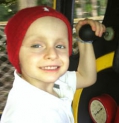Protecting "off-the-shelf" NK cell therapies from rejection

Mentor Name: Robin Parihar
Our overarching goal is to develop “off-the-shelf” chimeric antigen receptor (CAR)-expressing natural killer (NK) cell therapies for solid tumors. The objective of this proposal is to enhance the survival of adoptively transferred “off-the-shelf” CAR-NK cells in tumor-bearing recipients by protecting them from immune rejection by alloreactive T cells. Modifications to develop “off-the-shelf” cell therapy using allogeneic products have focused mainly on T cells. Methods that either (1) delete or perturb TCR signaling, (2) delete or down-modulate MHC class I or II expression, or (3) utilize activation markers on alloreactive T cells as targets for their elimination, have been devised to protect T cells from allo-rejection. However, these methods cannot be generalized to NK cells as NK do not express TCRs, and down-modulation of MHC molecules or use of activation markers as targets will trigger NK cell fratricide during ex vivo generation. Thus, our approach using a cytotoxic chimeric HLA molecule (CHAR) or a CD30-CAR represents a unique and first-of-its-kind method to provide allo-rejection resistance to human NK cells. We have generated several retroviral constructs encoding the CHAR and CD30-CAR with different co-stimulatory endodomains, CD28 or 4‑1BB. To determine which construct favors NK activation, either alone or when co-expressed with a CAR targeting GD2 on neuroblastoma and soft-tissue sarcomas, we will co-culture with CHAR/CD30-CAR NK with alloreactive T‑cells in a mixed lymphocyte reaction model. NK cells expressing both CHAR (or CD30-CAR) and a tumor-directed CAR should kill both tumor and alloreactive T-cells and proliferate. The optimal CHAR/CD30-CAR combination that allows NK function with minimal exhaustion in cultures with alloreactive T-cells and tumor will be established.

